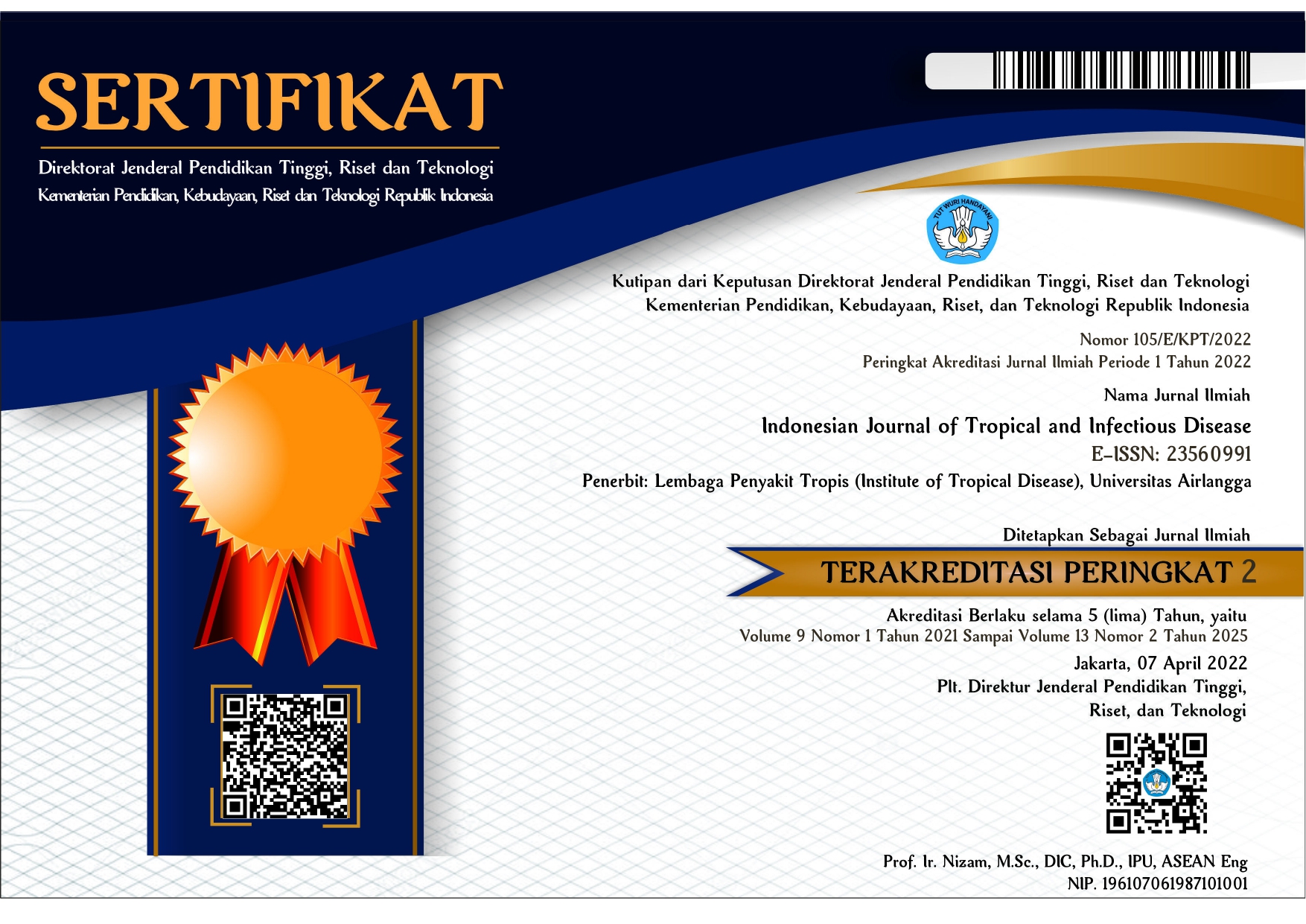MODEL OF LOCAL CAPACITY DEVELOPMENT FOR THE TROPICAL DISEASES HANDLING IN EAST JAVA
Downloads
Indonesia is a tropical country with its all potential for tropical diseases that are vulnerable to attack its population. This study aims to identify the mechanisms of the tropical disease handling and the potentials that can be done to increase the capacity of tropical disease handling itself. The focus of this research is to increase the capacity of the tropical diseases handling existing in East Java, more specifically in some regencies or cities, among others are Bojonegoro, Sampang and Pacitan. The approach of the study was the qualitative approach which was characterized by the existence of an actual setting, researchers as a key instrument, emphasizing the process, and the data analysis is inductive. Data were collected using in-depth interview has well as secondary data from health care institution and the internet. A focused group discussion was also occupied to enrich the results, the cases were illustrated and the models were structured more comprehensively in the handling of tropical diseases. Participants of this study were health care workers who work at the health institutions including the Health Department, Hospitals, the and Public Health Centers. The findings were all analyzed qualitatively. The results of this study indicated that there are four dimensions of capacity, namely the capacity of the human resource, the capacity of the institution, the capacity of the system and the capacity of the community or the community itself.
Hidayat T. Analisa Faktor yang Memengaruhi Kepatuhan Petugas Kusta dalam Pelaksanaan SOP Pelayanan Kusta di Puskesmas Kabupaten Sampang Analysis of Factors Affecting Obedience Officer Leprosy in the Implementation of Leprosy SOP Services District Puskesmas Sampang. J Adm dan Kebijak. 2012;10(2):68–72.
Morrison T. Actionable Learning: A Handbook for Capacity Building Through Case Based Learning. Asian Development Bank Institute; 2001.
United Nations Development Programme. Capacity Development: Lessons of Experience and Guiding Principles. Wignaraja K, editor. New York: United Nations Development Programme; 1996.
Laksono. Pelaksanaan Desentralisasi Kesehatan di Indonesia 2000-2007: Mengkaji Pengalaman dan Membahas Skenario Masa Depan [Internet]. 2010. Available from: http://www.kebijakankesehatanindonesia.net/images/stories/fruit/DesentralisasiKesehatan 2007_FIX_TYO.pdf
Brown L, LaFond A, Macintyre K. Measuring Capacity Building. University of North Carolina at Chapel Hill: Carolina Population Center; 2001.
Mondy RW, Noe RM. Human Resources Management. New York: Prentice Hall; 2005.
Torrington D, Hall L, Taylor S. Human Resource Management. Essex: Pearson Education; 2008.
Storey J. Human Resource Management: A Critical Text. London: Cengage Learning; 2007.
Armstrong M. Armstrong's Essentials Human Resource Management Practice: A Guide To People Management. Philadelphia; 2010.
Milen A. What do we know about capacity building? : An overview of existing knowledge and good practice. 2001;(June).
Berry LL. On Great Service: A Framework for Action. New York: The Free Press; 1990.
James VU. Capacity Building in Developing Countries: Human and Environmental Dimensions. Westport, Connecticut London: PRAEGER; 1998.
Thompson J. Participatory Approaches in Government Bureaucracies : Facilitating the Process of Institutional Change. World Dev. 1995;23(9):1521–54.
Bush R, Dower J, Mutch A. Community Capacity Index. Cent Prim Heal Care Univ Queensl. 2002;VERSION 2.
Buchan J. Health sector reform and human resources: lessons from the United Kingdom. Oxford Univ Press. 2000;15(3):319–25.
Lane J-E. New Public Management. Int Public Manag J. 2001;4:115–8.
Osborne D, Gaebler T. Reinventing Government: How the Entrepreneurial Spirit is Transforming the Public Sector (Plume) Paperback. New York: Penguin Group; 1993.
Shah A, Chaudhry TT. Implementing Decentralized Local Governance: A Treacherous Road with Potholes, Detours and Road Closures. 2004;
Putra FI, Rahman A, Sudiarno A. Perancangan Knowledge Management System Dalam Penanganan Penyakit Tropis dengan Pemenuhan Prinsip Ergonomi Kognitif. Institut Teknologi Sepuluh Nopember (ITS) Surabaya; 2010.
Miles MB, Huberman AM. Analisis Qualitative Data. Jakarta: UI Press; 1992.
Moleong LJ. Metodologi Penelitian Kualitatif. Bandung. Remaja Rosdakarya; 2001.
Denzin NK, Lincoln YS. Handbook of Qualitative Research. New York: SAGE Publications; 2009.
The Indonesian Journal of Tropical and Infectious Disease (IJTID) is a scientific peer-reviewed journal freely available to be accessed, downloaded, and used for research. All articles published in the IJTID are licensed under the Creative Commons Attribution-NonCommercial-ShareAlike 4.0 International License, which is under the following terms:
Attribution ” You must give appropriate credit, link to the license, and indicate if changes were made. You may do so reasonably, but not in any way that suggests the licensor endorses you or your use.
NonCommercial ” You may not use the material for commercial purposes.
ShareAlike ” If you remix, transform, or build upon the material, you must distribute your contributions under the same license as the original.
No additional restrictions ” You may not apply legal terms or technological measures that legally restrict others from doing anything the license permits.























